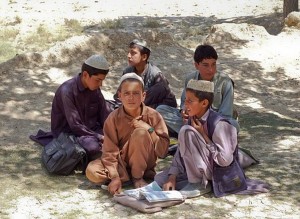Israel’s DC envoy snubs J Street, other left-wing Jewish groups
Since taking his post as Israel’s ambassador to the United States in 2013, Ron Dermer has refused to meet with J Street, a liberal Middle East advocacy group. He has likewise not engaged with other left-leaning Jewish groups often critical of the Netanyahu government.
Liberal Jewish activists told The Times of Israel that the envoy’s unwillingness to speak with them is further evidence of the splintering relations between Jerusalem and the American Diaspora, and the growing partisan divide over Israel in the United States.
“He may deeply disagree with our views, but they are representative of the majority of American Jews on Israel and a viable solution to the conflict,” Jessica Rosenblum, J Street’s senior vice president of public engagement, told the Times of Israel. “And it’s not just a majority of American Jews, but a growing majority.”
Recent polling has shown that Democrats and Republicans are diverging on their views about the seemingly intractable conflict. The Pew Research Center found in January that 79 percent of Republicans “sympathize” more with Israel than the Palestinians, compared to just 27% of Democrats — of whom about an equal percentage supported Palestinians more. In the last election, 71% of US Jews voted Democrat.
Beyond J Street, which has sent multiple written requests for a meeting since Dermer assumed his post six years ago, and for him to address its galas and conferences, the ambassador has not met with other leading left-wing Jewish groups, including the New Israel Fund or Americans for Peace Now, according to sources with knowledge of the situation. Those groups, however, have not sought a meeting in the frequent and persistent way J Street has.
A source with Americans for Peace Now said a meeting was initially scheduled years ago, but Dermer then had to travel out of town. Since then, the organization has not “pursued it diligently,” the source said. But neither was any engagement initiated on the ambassador’s end.
Despite repeated requests, Ambassador Dermer declined to comment for this report. In public comments, Dermer has highlighted the importance of bipartisan support for Israel.
Dermer’s predecessor, Michael Oren, who held the post from 2009 to 2013, regularly met with J Street and other progressive Jewish organizations.
“Generally speaking, every ambassador sees his job in a different way,” Oren told The Times of Israel. “I saw myself very much as the ambassador of the people of Israel to the people of the United States. I don’t want to speak for Ron, but my sense is he’s more sort of the prime minister’s ambassador.”
Marc Lamont Hill Moves From Justifying Terrorism to Promoting It
Several months ago, CAMERA wrote about the self-promoting CNN commentator and Temple University professor Marc Lamont Hill, pointing out his bigoted anti-Israel disinformation campaign and defense of Palestinian terrorists.Boycott-Israel activists disrupt Holocaust film in Berlin
The Investigative Project on Terrorism provides new evidence that Lamont Hill has progressed from being a radical, anti-Israel propagandist and justifier of terrorism to one who directly promotes Palestinian violence and terrorism against Israelis.
Lamont Hill was one of the advertised speakers at a conference by a leading BDS (Boycott, Divestment and Sanctions) group that was held on September 28-30, 2018. In an audio recording of Lamont Hill’s remarks there, he can be heard using his anti-Israel propaganda to advocate for violence.
He repeatedly urges his audience not to “romanticize nonviolence, ” and concludes that “we have allowed this nonviolent thing to become so normative that we’re undermining our own ability to resist in real robust ways.”
Lamont Hill previously justified the kidnappings and murders of three Israeli boys in 2012, saying:
This starts with occupation. There’s an apartheid state in Gaza. There’s an apartheid state in the region. That’s what we need to talk about. That’s what starts as resistance. It’s not terrorism.
He bemoaned Israel’s employment of the Iron Dome air defense system to intercept short-range rockets and artillery shells fired into Israel, because, he lamented, “it takes away all of Hamas’s military leverage.”
And he labelled the call for Palestinians to reject hatred and terrorism “offensive and counterproductive.”
Two activists from the Boycott, Divestment and Sanctions campaign disrupted the presentation of an Israeli Holocaust film in Berlin last week, prompting Israeli security officials to evict the protesters as the audience booed the stoppage caused by the BDS people.
Based on video footage of the disruption, The Jerusalem Post was able to identify one of the BDS activists as Ronnie Barkan, an anti-Zionist from Israel, whose conduct Berlin’s intelligence agency classified in an August report as antisemitic.
Barkan did not immediately respond to a Post press query regarding his activity and the name of the second activist. He did, however, acknowledge on Twitter that “In case you were wondering what was being screened while we disrupted the event.” The activists can be seen on a video holding a sign that read, “No culture in whitewashing Apartheid.”
The nearly two-minute video of the disruption by Barkan and his co-activist was posted on YouTube by the pro-Israel Germany-based group Aktionsforum Israel. The group wrote under the video that BDS attempted to sabotage a film about the Holocaust on October 4.
“This recalls the speech from Bjoern Hoecke with the culture of forgetting,” the group wrote. “Both BDS and parts of the Alternative for Germany [AfD party] as well as the NPD [neo-Nazi party] have a problem with this topic.”
Hoecke, an AfD politician, slammed the memorial in Berlin to victims of the Nazi Holocaust as a “monument of shame.”




 Rome, October 11 - The leader of the Roman Catholic Church will soon take drastic steps to address the sexual abuse scandal plaguing the organization, a spokesman announced today, by moving all those who have engaged in such conduct to a country where indigenous culture condones or encourages it, but Western activists and journalists deem it unworthy of sustained attention.
Rome, October 11 - The leader of the Roman Catholic Church will soon take drastic steps to address the sexual abuse scandal plaguing the organization, a spokesman announced today, by moving all those who have engaged in such conduct to a country where indigenous culture condones or encourages it, but Western activists and journalists deem it unworthy of sustained attention.








































